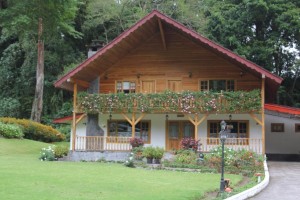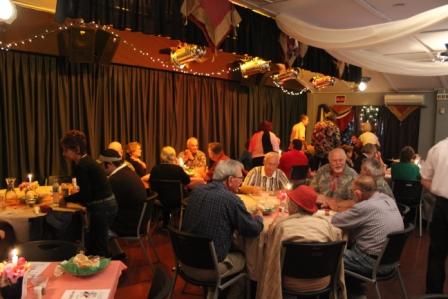Two people have now sent me this article by Bob Sullivan from The Red Tape Chronicles at MSNBC and it puts Panama on the front line when talking about where to retire and how attractive it can be on a limited budget. A lot of people are not be interested in a $400,000 high rise condo in Panama City or a million dollar beach mansion. They seek something else. Here in Panama you can find affordable homes and a lifestyle that costs about 50% of what it does back home, plus a lot less stress!!
Carol Denne and her husband Larry both worked government jobs for decades, but as they entered their late 50s, Larry’s fast-shrinking 401(k) account and Carol’s modest pension pointed to one stark reality: Retiring with dignity in their Philadelphia suburb would be impossible. In fact, Carol ran the numbers over and over and came to the conclusion that retiring anywhere in the U.S. was unrealistic.
“Either my husband was going to have to work until he died, or we were going to have to leave the country,” she said. “He’d been working since he was 15, and that was long enough. So we left.”
So four months ago, Carol and Larry departed the U.S. — leaving behind their four children and five grandchildren — and moved to a mountain village in Panama.
“We found we could live on my retirement here,” Carol said by phone from their new home outside the town of David, on the Latin America’s country’s west side. They were surprised to find a healthy number of “gringos” already living in their suburb, called Volcan. “We are seeing a growing number of ‘ex-pats’ who are in our same situation. This points to a growing number of families that are torn apart as parents and aunts and uncles are forced to move away to retire.”
They pay $500 per month to rent a four-bedroom home, enjoy dinners for $10, and now believe they’ll be able to live out their lives without worrying about running out of money.
With Larry 59 years old and Carol 57, the Dennes fit into the demographic that might actually be suffering the most during the current economic downturn. While much has been written about youth who graduate college and have few economic opportunities and families threatened with foreclosure, both groups will presumably benefit when the economy rebounds — even if the recovery is 10 years off. But for workers nearing retirement, there is no time to make up their share of the $2.7 trillion in retirement investments that vanished between 2007 and 2009, according to the Urban Institute.
As we’ve chronicled here before on Red Tape, older Americans who lose their jobs have a hard time finding new employment. Many unemployed 50-somethings believe ageism is a factor, and there is some data that might support those accusations. The unemployment rate for workers aged 55-64 has more than doubled, from 3 percent in 2006 to 7.1 percent in 2010, according to a recent report by Congress’ Government Accountability Office. Median unemployment length for the group soared from 11 weeks to 31 weeks from 2007 to 2010. The report also found that an estimated 25 percent of adults 50 and over had exhausted their savings in response to a layoff or other recession-related event, and half in that age group say they had delayed a medical or dental procedure to make ends meet. Meanwhile, the normal safety net of home equity has been decimated by the housing bubble collapse.
Things were different for the Dennes before 2008, before the economic crash caused by the near collapse of the financial system. Larry was a manager at a local recycling company and had dutifully socked away money into his 401(k). Between her $3,000 per month pension earned as a civilian working for the Navy and his retirement savings, the couple thought they’d have options. Then, the crash swept away most of Larry’s 401(k) and reality hit.
“I’m angry about that, angry that was situation we were faced with. It was difficult leaving friends and family behind,” Carol said. “We didn’t have that much to start with. To lose all that was a big deal.”
The couple had never been to Latin America, and spoke no Spanish, but they were desperate for options and attended a seminar on retiring in Panama. They were hooked.
“Our friends couldn’t believe we were going to do that,” Carol said.
It’s a conversation that’s being repeated around the country. Solid data on the number of U.S. retirees is hard to find, but the trend seems on the rise. The Social Security Administration paid benefits to 509,000 overseas retirees in 2008, the most recent available data. That’s a sharp uptick from the 396,000 who received benefits in 2000.
The economics seem irresistible. Housing costs in places like Ecuador, Mexico and Panama are a fraction of those in the U.S. Many Latin American countries offer retirement benefits and health care to U.S. ex-pats living there. And the pace of life is hard to beat.
“We live in an eternal spring,” Carol said. “We’re in the mountains, where the temperature is always around 75 or 80. It never snows. There’s no leaves to rake in the fall, no shoveling in the winter. It’s absolutely beautiful here.”
Panama regularly ranks among the top places for ex-pats to retire when magazines like International Living or organizations like AARP conduct surveys. International Living ranked Panama third globally, behind only Ecuador and Mexico, in a survey that weighed cost of living, health care, culture, infrastructure, etc. (The U.S., by the way, ranked 22nd, just ahead of Slovenia and the Dominican Republic). Panama’s “pensionado” program also offers deep discounts to seniors on everything from prescription medicine to food and airline tickets.
Those will come in handy, as the couple has plans to return to the U.S. frequently to see their children and grandchildren. Meanwhile, a steady stream of visitors is coming to their piece of paradise.
“We’ve already had one daughter come down, and another one is coming in January,” Carol said.
Technology helps keep them connected with home — Facebook, email, and Skype make it relatively easy to keep up with friends and family. Of course, it’s not flawless. I had to dial the Dennes’ phone number six times before the call went through. Other ex-pats on bulletin boards devoted to life in Panama complain that electricity and water services aren’t always reliable. But such hiccups are part of life in Panama, Carol said.
“You learn to go with the flow,” she said. “The pace of life is different.”
The couple has already adjusted, for the most part, Carol says.
“I miss nothing. Maybe the convenience having so many stores nearby,” she said. A painter, she has to travel about 45 minutes to buy supplies like acrylic paints.
But that’s not going to change, as the couple plans has no plans to return to the U.S.
“We’re down here for the long haul. We can’t afford to live in the States,” she said. “My sister is older, she has a good job, and she’s going to have to work 10 years before she retires. I’m shocked that that has happened. I don’t know what’s going on. Boomers are working even longer, or until they die, or are leaving country like we are. The recession has affected everybody in hard ways.”
Pre-show dinner at the Boquete Community Playhouse


